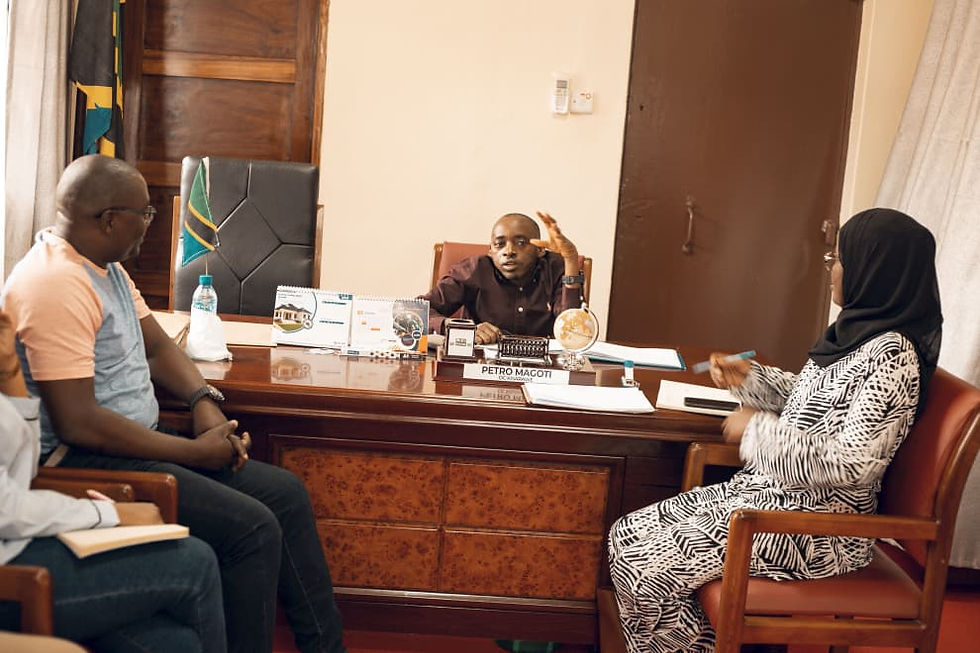A Journey Beyond FGM, Starting with Alternative Rites of Passage.
- faithmkony
- Nov 14, 2023
- 3 min read
Updated: Nov 17, 2023

In the heart of Mara, Tanzania, a team from C-Sema with support from UNFPA conducted a ten-day documentary screening in Tarime DC under the ‘’My Choice, My Right’’ program (Chaguo Langu, Haki Yangu (CLHY)) funded by the Embassy of Finland Tanzania. This documentary aimed to promote alternative rites of passage as a culturally sensitive and safer option to Female Genital Mutilation (FGM).
The documentary was the result of months of dedication and collaboration by local filmmakers, activists, and individuals from the very community it aimed to uplift. Keep in mind that in this region FGM has long been a painful rite of passage for young girls, where the tradition is believed to ensure their acceptance into adulthood and marriage within the community. This is why the community’s receptiveness to the documentary’s message was a critical requirement.
That being said, the documentary’s opening night took place in Nyanungu ward. Prior to the screening, the team comprised of three C-Sema staff and two supporting staff from ATFGM Massanga utilised the available PA system to inform community members where and when the screening would take place. During these efforts, the team had a chance encounter with Ana, a 17-year-old- girl with a captivating story.
Due to financial constraints, Ana was not able to continue her secondary education, but instead of getting married as is the norm in her society for girls who do not go to school, she decided to start a barber shop business. It is important to note that in the Kurya community being a barber is not a typical occupation for a woman. However, this brave girl changed this narrative and now her barber shop which she runs together with her mother has become ‘the spot’ for individuals to get their hair trimmed.
‘’At first, it was difficult because the men here who are the main customers refused to get their hair cut by a woman, much less a young girl. They would tell me that if I kept on working here no one would marry me in the future, but this business is the only way I could ease the financial burden from my mother and help my siblings go to school. I believed in myself and my work and now a lot of the men come to my shop’’ said Ana, as she carefully wielded a pair of clippers over her client’s head. This goes to show how societal perceptions can change and adapt over time.
After this short conversation with Ana, the team was ready to start the screening. About 200 community members had gathered at the ward’s football field which was the designated screening area.
A mix of anticipation and excitement filled the air as the film unfolded with a powerful narrative, introducing viewers to the history of FGM in Mara and the profound shift taking place within the community. It also revealed the emotional and physical turmoil that had accompanied the traditional rite of passage for generations. As the documentary delved deeper, it showcased two clan elders suggesting an alternative rite of passage that they thought would preserve the Kurya culture while simultaneously protecting the rights of girls. The end scene credits rolled with generally positive reactions from the audience, with some local activists who were bold enough to share their thoughts on what they had just watched.
Notably, one Mr. Ntaghira shared his insights on why the practice was detrimental to the physical and psychological well-being of girls and women, and the need for it to be eliminated. He also provided a hopeful sentiment on the perception of FGM in some households and emphasised the need to have more awareness-raising initiatives specifically for young girls and boys within society.
‘’In some households, it has become a personal decision rather than a must. This means that, some girls even the ones within the same household as a sibling or relative who experienced FGM now refuse to get cut and parents do not force them. More interventions and awareness-raising efforts are required in our society to continue to tackle this issue’’.
Suffice it to say that Nyanungu ward set the tone for the rest of the screenings in Gorong’a, Mwema, Susuni, and Bumera. Over 800 individuals were reached through this activity which proved to be a powerful tool for raising awareness, shifting attitudes, and fostering community engagement in the fight against Female Genital Mutilation.
By the time the team completed their mission, a powerful message resonated within these wards i.e., traditions can evolve to reflect the principles of human rights and gender equality as seen by Ana’s story, and that alternative rites of passage not only safeguard the physical and emotional well-being of girls but also strengthens community bonds towards progress.
We hope that the activity will serve as a catalyst for further dialogue, collaboration, and action, leading to the eradication of FGM and the adoption of safer and healthier rites of passage practices in the Mara region.
Written by Faith Mkony.



